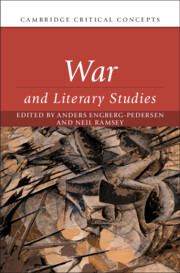Book contents
- War and Literary Studies
- Cambridge Critical Concepts
- War and Literary Studies
- Copyright page
- Contents
- Figures
- Contributors
- Acknowledgments
- Introduction: War, Literature, and the History of Knowledge
- Part I Origins and Theories
- Part II Foundational Concepts
- Part III Emerging Concepts
- Chapter 16 War and Drones
- Chapter 17 War and Humanitarianism
- Chapter 18 War and Capitalism
- Chapter 19 War and Revolution
- Chapter 20 War and Biopolitics
- Chapter 21 War and Nuclear Criticism
- Chapter 22 War and the Personality of Power
- Index
Chapter 20 - War and Biopolitics
from Part III - Emerging Concepts
Published online by Cambridge University Press: 15 January 2023
- War and Literary Studies
- Cambridge Critical Concepts
- War and Literary Studies
- Copyright page
- Contents
- Figures
- Contributors
- Acknowledgments
- Introduction: War, Literature, and the History of Knowledge
- Part I Origins and Theories
- Part II Foundational Concepts
- Part III Emerging Concepts
- Chapter 16 War and Drones
- Chapter 17 War and Humanitarianism
- Chapter 18 War and Capitalism
- Chapter 19 War and Revolution
- Chapter 20 War and Biopolitics
- Chapter 21 War and Nuclear Criticism
- Chapter 22 War and the Personality of Power
- Index
Summary
This chapter situates the work of the German writer W. G. Sebald within Foucault’s paradigm of biopolitical war, which is torn between a concern with State racism and a concern with extinction. Sebald’s work is often considered in relation to World War II and the Holocaust, in other words, in relation to State racism. The chapter seeks to shift this frame of reference toward the Cold War and the reality of Mutually Assured Destruction, which are important concerns in Sebald’s oeuvre as well. This invites us to consider Sebald as an author engaged not only with State racism but also with what Foucault calls “the atomic situation.” Specifically, the chapter considers the use of lists in Sebald’s work not only as a memorial effort in response to the destruction of World War II but also as an effort to record all of life in anticipation of its disappearance. Finally, it shows that such a use of the list exceeds Sebald’s fiction and can be found in a range of related contemporary fiction and theory. Today, in the Anthropocene, the biopolitical war exceeds the issue of State racism and includes that of extinction, human and otherwise – including the extinction of literature itself.
- Type
- Chapter
- Information
- War and Literary Studies , pp. 321 - 335Publisher: Cambridge University PressPrint publication year: 2023

